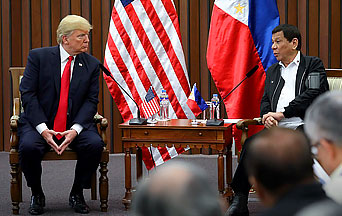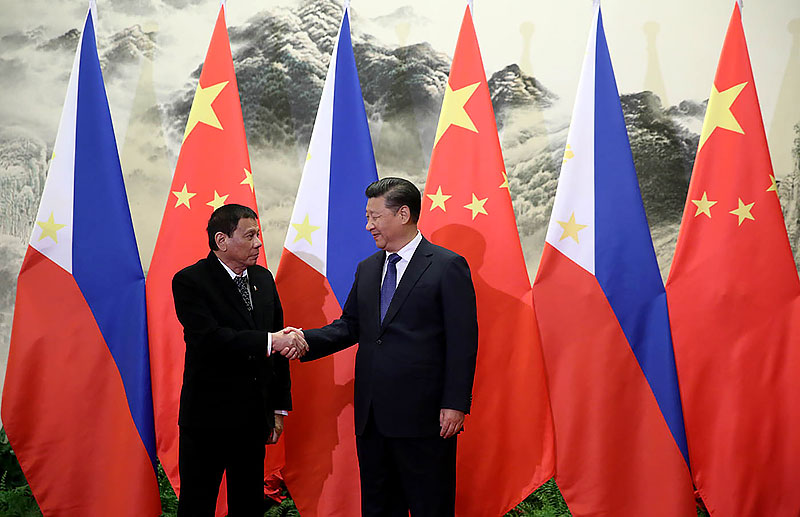
With the Chinese coronavirus and the American Democratic candidate primary dominating the news, few noticed the February 11 announcement that President Rodrigo Duterte, of the Philippines, notified the United States of his intention to end his country’s Visiting Forces Agreement with the United States. If carried out, this decision is nothing less than a victory for China and Russia in the Asia-Pacific and a defeat for both America and its regional allies that will persist long after the coronavirus runs its course.
For nearly a century, the United States and the Philippines have enjoyed close relations forged in blood. Over 60,000 American soldiers were killed or wounded in the liberation of the Philippines in World War II. During the Korean and Vietnam Wars and throughout the Cold War, the Philippines provided crucial bases for American troops, airplanes, and ships, and the country served as a buffer in the fight against the spread of communism. In 1951, the two countries signed a Mutual Defense Treaty, obligating each to come to the aid of the other in case of military attack.
In 1998, seven years after the closure of the permanent U.S. bases in the Philippines, the two countries signed the Philippines-U.S. Visiting Forces Agreement (VFA). The VFA lays out the rules, guidelines and legal status of American military personnel when operating in the Philippines. Among other things, it allows U.S. soldiers to enter without a visa, removes import taxes on equipment and grants free entry to U.S. aircraft and naval vessels.
Who Will Guarantee the Peace?
The VFA also sets the legal framework for crimes committed by U.S. military personnel while in the country. The Philippines has jurisdiction over American soldiers who are accused of a crime unless the offense is directly related to U.S. security or is only punishable by U.S. law. The U.S. has jurisdiction over its personnel if they commit crimes against U.S. property, security or against other U.S. personnel.1
Nearly 100 countries have signed agreements with the United States similar to the VFA. Such agreements are common and a prerequisite for sending military personnel to another country.
In addition to the VFA, in 2014 the United States and the Philippines signed the Enhanced Defense Cooperation Agreement (EDCA). It allows the U.S. military to rotate troops in the Philippines for extended periods of time, to build and operate military facilities in the Philippines for both U.S. and Philippine forces and to give Philippine forces access to U.S. aircraft and naval vessels.
The Philippines-U.S. VFA makes possible one of the most mutually beneficial alliances in the world. Thanks to the VFA, the United States rotates thousands of U.S. troops, naval vessels and aircraft every year to the Philippines, providing valuable training to the Philippine military, assistance in counter-insurgency and inclusion under the American security umbrella. Over 300 military exercises are planned for 2020, including Exercise Balikatan (“Shoulder to Shoulder”) a yearly training exercise that has taken place for decades. From 2016-2019, the United States provided $554 million in military aid to the Philippines. In return, the United States has a valuable ally against China in the Asia-Pacific region.
If You Wish for Peace, Prepare for War
China is engaged in a massive campaign to intimidate its enemies, steal technology, build up its military and supplant the United States as the global superpower. The Chinese are investing billions of dollars in countries across the world, building infrastructure, buying up resources and expanding influence.
Under the Trump Administration, U.S. foreign policy now regards China as an economic and military threat to the United States. To confront an increasingly assertive China, the United States needs allies in the Asia-Pacific region. Along with Japan and Taiwan, the Philippines’ strategic location in Southeast Asia at the edge of the South China Sea makes it an essential part of any U.S. strategy to contain China.
This strategy is threatened by the decision of Philippines President Rodrigo Duterte to cancel the VFA with the United States on February 11. According to the terms of the VFA, each party must give 180 days’ notice before officially canceling. Therefore, the VFA will officially end in August.
Terminating the VFA leaves the U.S. without any legal framework to maintain troops in the Philippines. The U.S. will have no choice but to remove all military personnel from the country. In a message to reporters, Philippines Defense Secretary confirmed that after August there will be no more military exercises with the U.S. “Once the termination is final, we will cease to have exercises with them,” he said.2
Cancelling the VFA greatly weakens the 1951 Mutual Defense Treaty. In a speech to the Philippine Senate on February 6, Philippine Foreign Secretary Teodoro Locsin Jr. said that cancelling the VFA “will likely dilute the U.S. commitment to the MDT” and make the MDT “just a piece of paper.”3
Keep the Three-Legged Stool Standing and Strong
Ostensibly, Duterte’s reason for terminating the VFA is in retaliation for the United States refusal to grant a visa to his former police chief Ronald dela Rosa, the architect of Duterte’s infamous anti-drug campaign, which has resulted in the summary execution of more than 5,500 people since 2016.
It is more likely that the visa denial was merely a pretext for Duterte to further his goal of breaking with the United States. Since his election in 2016, President Duterte has been vocal in his anti-American sentiment and has worked to pull the Philippines away from the United States and into the orbit of China and Russia.
Duterte has called Vladimir Putin his “idol” and visited the country twice. During his last visit in October 2019, Duterte discussed buying Russian weapons, including helicopters, warships, drones and tanks.4 He also invited Russian companies to develop oil and gas reserves in the Philippines and signed an agreement to explore the possible construction of nuclear power plants.5
But the country that Duterte has warmed up to the most is China.
Two days after announcing the end of the VFA with the United States, the chief of the Armed Forces of the Philippines Gen. Felimon Santos Jr. said that the Philippines would seek VFAs with other countries, including China.6
After years of Chinese encroachment on Philippine territorial waters in the South China Sea, the Philippines won a court case against China in the Permanent Court of Arbitration in The Hague. It ruled in 2016 that China’s so-called “nine-dash line” of ownership encroaches on Philippine sovereignty under the United Nations Convention on Laws of the Sea (UNCLOS).7 China simply ignored the decision and continued its illegal fishing and energy exploration in Philippines waters.
If You Want Peace, Prepare for War: Why Nuclear Weapons Are Still Needed
When Duterte took power in 2016, he simply acquiesced to Chinese encroachment. In his 2019 State of the Nation speech, he dismissed it as a reality that the Philippines could do nothing to change. “We own the West Philippine Sea but China controls it. That is the reality,” he said, although he did admit that he asked Xi Jinping to “please allow” Filipinos to fish in the country’s waters. In June 2019, a Chinese ship rammed and sank a Philippine fishing boat in Philippine territorial waters and abandoned the 22-man crew to its fate.8 The fishermen were later rescued by a Vietnamese vessel. Most Filipinos were outraged with the flagrant attack, but Duterte dismissed the incident as “a little maritime incident” and “not worth nuclear war.”9
Even as China openly encroaches on Philippine territorial waters, Duterte is working with Xi Jinping on joint oil and gas exploration. In August 2019, they established a joint steering committee to work on energy projects in the South China Sea, which met for the first time in October.10

Under Duterte’s “Build, Build, Build” infrastructure program, billions of dollars of Chinese money has flooded into the Philippines. China is now the largest source of foreign investment in the country, with nearly $24 billion pledged and $1 billion spent in 2018.11
Eternal and Natural Law: The Foundation of Morals and Law
Some of that money is spent on infrastructure such as roads, airports and dams, a part of part of China’s “Belt and Road Initiative.” However, some investment is going towards sensitive military infrastructure with national security implications. Last September, the Philippine military agreed to let a Chinese company, China Telecom, build communications infrastructure inside military bases. Philippine Senator Francis Pangilinan said that this “raises fears of electronic espionage and interference given the record of some Chinese firms for engaging in this illegal activity.”12
According to the Philippines’ Bureau of Immigration, more than 3 million Chinese nationals have entered the country between 2016 and 2018, a 538 percent increase that coincides with Duterte’s closer ties to China.13 Many of these are working illegally or have ties to the Chinese government, yet Philippine government officials admitted that they “don’t know” how many there are.14
Other threats to regional stability are the Islamic insurgency in the southern Philippine island of Mindanao.
After Duterte announced his intention to withdraw from the VFA with the United States, the U.S. Embassy in Manila announced that the decision “is a serious step with significant implications for the U.S.-Philippines alliance. We will carefully consider how best to move forward to advance our shared goals.”
Unfortunately, President Trump responded with indifference to the break with America’s long-standing ally. When probed by reporters about asking Duterte to reconsider his decision, the President said, “Well I never minded that very much, to be honest. We helped the Philippines very much. We helped them defeat ISIS…I don’t really mind if they would like to do that, it will save a lot of money. My views are different from others.”15
Saint Louis IX Was Both a Man of Peace and a Warrior
The Filipino people are traditionally one of the most pro-American nations in the world. A Pew Research Center Poll rated the Philippines as the most pro-Trump and pro-American nation of all the 37 nations that it analyzed.16 Approximately 75 percent of Filipinos view the United States positively, and the same percentage supports an American military presence in the country.17 Even members of Duterte’s own government, including Foreign Secretary Teodoro Locsin, openly spoke against terminating the VFA with the United States in the weeks before it was cancelled.
The United States should use all legal and peaceful measures to pressure President Duterte to reverse his decision and maintain the VFA with the U.S. A strong American presence in Southeast Asia, containment of an increasingly aggressive China and a free and secure Philippines is impossible without it. China and Russia are more than willing to fill the vacuum left by an American withdrawal.
Footnotes
- https://www.washingtonpost.com/politics/2020/02/13/president-duterte-wants-scrap-philippines-us-military-agreement-this-could-mean-trouble/
- https://www.philstar.com/headlines/2020/02/13/1992803/no-more-joint-training-us-after-180-day-vfa-transition-period
- https://www.rappler.com/nation/251198-full-text-locsin-speech-impact-assessment-visiting-forces-agreement-termination
- https://www.scmp.com/news/asia/southeast-asia/article/3031168/philippine-president-rodrigo-duterte-flies-russia-meet
- https://www.cnnphilippines.com/news/2019/10/26/russia-philippines-oil-and-gas-exploration.html
- https://www.philstar.com/headlines/2020/02/13/1992776/afp-eyes-vfas-china-japan
- https://www.cnn.com/2016/07/04/asia/south-china-sea-un-case-explainer/index.html
- https://news.abs-cbn.com/news/06/12/19/chinese-ship-sinks-ph-vessel-abandons-22-pinoy-fishermen
- https://www.wsj.com/articles/how-china-treats-a-friend-11560986088
- https://www.rappler.com/nation/243727-philippines-china-first-meeting-oil-gas-exploration-deal
- https://www.cnbc.com/2018/11/23/chinese-investment-in-the-philippines.html
- https://news.abs-cbn.com/news/09/12/19/pangilinan-hits-deal-allowing-chinese-linked-3rd-telco-to-build-infra-in-ph-military-bases
- https://international.thenewslens.com/article/121991
- https://www.scmp.com/week-asia/economics/article/2178749/chinese-workers-flood-philippines-yet-dutertes-officials-dont
- https://www.aljazeera.com/news/2020/02/trump-brushes-duterte-decision-military-pact-200212204927062.html
- https://www.pewresearch.org/global/2017/06/26/u-s-image-suffers-as-publics-around-world-question-trumps-leadership/
- https://www.pewresearch.org/global/2017/09/21/people-in-the-philippines-still-favor-u-s-over-china-but-gap-is-narrowing/
